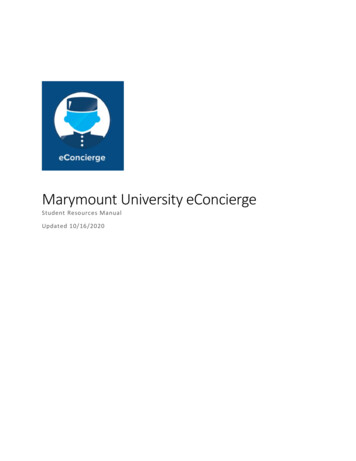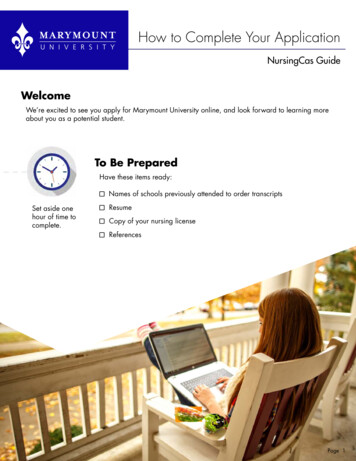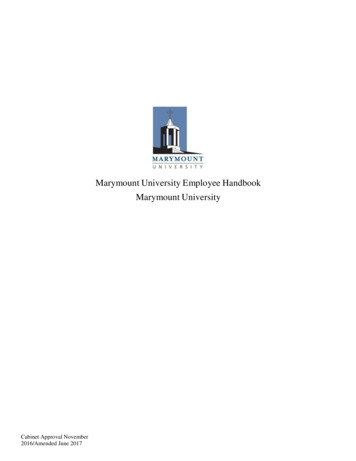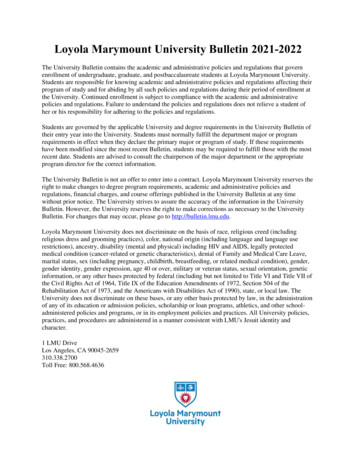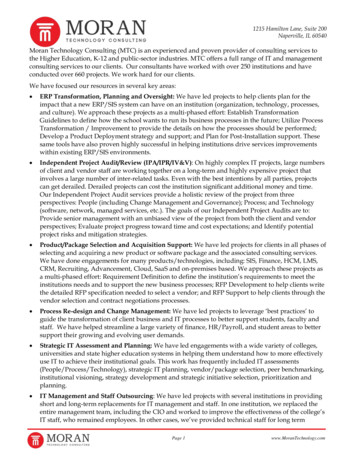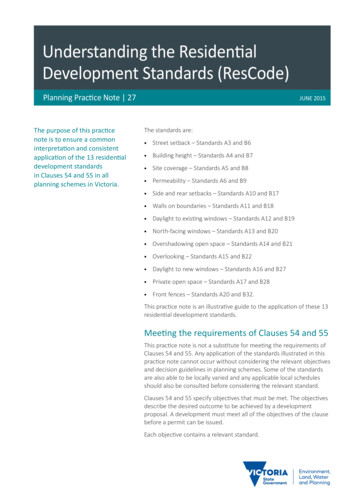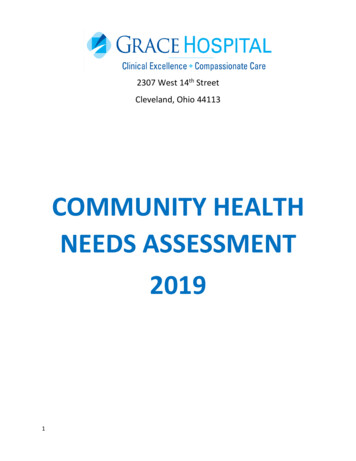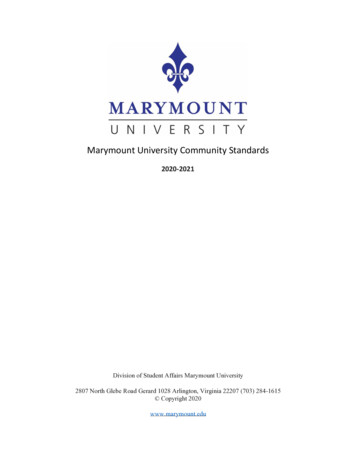
Transcription
Marymount University Community Standards2020-2021Division of Student Affairs Marymount University2807 North Glebe Road Gerard 1028 Arlington, Virginia 22207 (703) 284-1615 Copyright 2020www.marymount.edu
Dear Marymount University Students,Welcome to the 2020 - 2021 academic year! I am excited to welcome our new studentsto the Marymount University community. For those who are returning, it is great tohave you back!As you begin the 2020-2021 academic year, I hope you will embrace the opportunitiesprovided by Marymount faculty, staff, and other students. You have an important role inyour own transformation. You have an even greater responsibility to those around you. Iencourage you to use every resource, know every person, and invest in everyopportunity so that you and the Marymount community will continue to grow.The Community Standards book is a reflection of our commitment to a community guidedby our founding order, the Religious of the Sacred Heart of Mary. The legacy of the RSHMcan be seen in our commitment to intellectual curiosity, service to others, and a globalperspective.You have chosen to be a part of the Marymount University legacy. Our greatestideals are embodied in each student who chooses to contribute to and beimpacted by the Marymount community.After reading the policies and resources, I hope you are informed and inspired.Your actions, deeds, and words affect the experiences of other members of ourcommunity.In our Marymount community, dignity and humanity of every single person isparamount. Together, we will hold the members of our community to standards ofexcellence.I look forward to the coming academic year and wish you a year filled with challenges,successes, and continued growth.Sincerely,Brooke Berry, J.D.Dean of Students
Marymount University Student Community Conduct CodeSection 1: IntroductionMarymount Honor PledgeI agree to uphold the principles of honor set forth by this community in the MarymountUniversity mission statement, the Academic Integrity Code and Student Community ConductCode, to defend these principles against abuse or misuse, and to abide by the regulations ofMarymount University.Mission StatementThe Office of Student Conduct and Conflict Resolution upholds Marymount University’sstandards of behavioral conduct and academic honesty through the administration of fair,ethical and balanced processes. The Office of Student Conduct and Conflict Resolution iscommitted to the development of ethical decision-making and critical thinking within theCatholic higher education tradition of the Religious of the Sacred Heart of Mary and encouragesstudents to accept personal responsibility for their actions and hold themselves accountable totheir communities.Philosophy StatementThe Office of Student Conduct and Conflict Resolution is committed to an educational anddevelopmental process that balances the needs of individual students with the needs of theUniversity community. To accomplish this aim, the office has four philosophical tenets. Prevention – The Office of Student Conduct and Conflict Resolution educatesstudents about appropriate standards of conduct within the University communitythrough programming and dialogue before issues occur. The program seeks toreduce incidents by educating students about healthy decision-making, constructivediscourse, and bystander intervention. Intervention – The Office of Student Conduct and Conflict Resolution identifies thepersonal, educational, and social influences that result in academic and behavioralmisconduct on campus and intervenes through diverse methods of resolution thatplace emphasis on relationships, personal decision-making, community obligations,and student learning.
Harm Reduction – The Office of Student Conduct and Conflict Resolution engagesstudents in the examination of the impact of their behaviors on their relationshipswith the community and community members. After identifying the impact of theirbehaviors the office guides students toward repairing these relationships andreducing harm. Retention – The Office of Student Conduct and Conflict Resolution focuses onretaining students, when possible, through the creation of opportunities forstudents to learn from their experiences and decisions. By creating individualizedoutcomes, the Office of Student Conduct and Conflict Resolution offers students anopportunity to remain a part of the University community.PreambleThe University community is committed to fostering a campus environment that is conducive toacademic inquiry, a productive campus life, and thoughtful study and discourse. A communityexists on the basis of shared values and principles. As an institution founded by the Religious ofthe Sacred Heart of Mary, the University is committed to seven core values: professionalism,respect, integrity, diversity, excellence, faith, and service. The student conduct programpromotes these core values by providing expectations that call students to live purposeful,ethical, and moral lives. Student members of the community are expected to uphold and abideby both the core values and community values which together form the basis of the StudentCommunity Conduct Code.Ultimately, each member of the University community is expected to assume responsibility forhis/her conduct and to assume reasonable responsibility for the behavior of others. Thestudent conduct process at the University exists to protect the interests of the community andto challenge students to embody the values of the University. The process and outcomes areintended to challenge and shape students’ moral and ethical decision- making and to help thembring their behavior into accord with the community expectations. When a student is unable toconform his/her behavior to University community expectations, the student conduct processmay determine that he/she should no longer share in the privilege of participating in thiscommunity.Students should be aware that the University’s student conduct process is quite different fromcriminal and civil court proceedings. Procedures and rights in student conduct procedures areimplemented with fairness to all, but do not include the same due process protections affordedby the courts. Fair process, within these procedures, assures written notice and a Hearingbefore an objective decision-maker. No student will be found in violation of a University policywithout information showing that it is more likely than not that a policy violation occurred. Anysanctions will be proportionate to the severity of the violation and to the cumulative conducthistory of the student, as determined by the University.
Section 2: Jurisdiction over Student ConductThe University distributes the Student Community Conduct Code in the form of a link on theUniversity website. Visit www.Marymount.edu/StudentCommunityConductCode to access thepolicy online. Hard copies are available upon request from the Chief Conduct Officer. Studentsare charged with the responsibility of reading, and abiding by, the provisions of the StudentCommunity Conduct Code and the authority of the student conduct process. The StudentCommunity Conduct Code and the student conduct process apply to the conduct of individualUniversity students and University affiliated student organizations.The Student Community Conduct Code reflects a set of expectations for University students nomatter where or when their conduct may take place; therefore, the Student CommunityConduct Code applies to behaviors that take place on any University campus or location, atUniversity-sponsored events. It may also apply to off-campus conduct when the administrationdetermines in its discretion that the alleged conduct affects a substantial University interest.Substantial University interests include: Any action that constitutes a criminal offense as defined by federal, Virginia,Maryland, District of Columbia, or local law or regulation. This includes, but is notlimited to, single or repeat violations of any federal, state, or local law or regulation; Any situation where it appears that the student may present a danger or threat tothe health or safety of him/herself or others; Any situation that significantly impinges upon the rights, property, or achievementsof self or others; Any conduct that significantly breaches the peace and/or causes social disorder;and/or Any situation that is detrimental to the educational interests of the University.The Student Community Conduct Code may be applied to conduct that takes place from thetime a person accepts enrollment as a student and continues until the student withdraws orgraduates, including periods during semester breaks, between semesters, and duringtemporary separations, such as suspension and continuous registration.Further, the Student Community Conduct Code applies to guests of students who may be heldaccountable for the misconduct of their guests. Visitors to and guests of the University are alsoprotected by the Student Community Conduct Code and report violations of the StudentCommunity Conduct Code committed against them by a member of the University community.
There is no time limit on reporting violations of the Student Community Conduct Code as long asthe offending student was enrolled and/or had an active degree program at the University atthe time in which the alleged violation occurred; however, prompt reporting is important. Thelonger someone waits to report an offense, the harder it may become for University officials toobtain information and witness statements and to render a determination regarding allegedviolations. Though anonymous complaints are permitted, doing so may limit the University’sability to effectively investigate and respond to a complaint. Those who are aware ofmisconduct are encouraged to report it as quickly as possible to the Office of Student Living,Dean of Students, Equity & Inclusion, Office of Campus Safety and Security, the Office of theTitle IX Coordinator, and/or the Office of Student Conduct and Conflict Resolution. Universityemail is the University’s primary means of communication with students. Students areresponsible for all communication delivered to their University email address.Section 3: Violations of the LawAlleged violations of federal, state, and local laws and regulations are incorporated as offensesunder the Student Community Conduct Code. When an offense occurs over which the Universityhas jurisdiction, the University conduct process will usually go forward, notwithstanding anycriminal complaint that may arise from the same incident.When criminal charges are pending, the University may be delayed from conducting its owninvestigation and moving forward with a campus Hearing. The University, in consultation withlegal counsel and local authorities, will determine a period of time that will be considered areasonable delay. However, for the good order and safety of the community, the University willmove forward with its own investigation to determine if a student is responsible for a policyviolation.Section 4: Special ProvisionsA. Attempted ViolationsIn most instances, the University will treat attempts to commit a violation listed in the StudentCommunity Conduct Code as if that attempt had been completed. “Attempt” is defined as theintent to commit the predicate offense coupled with a substantial step toward commission ofthe predicate offense.B. Misconduct OnlineStudents are cautioned that behavior conducted online, such as harassment or bullying viaemail, can subject them to University conduct action. Students must also be aware that blogs,web page entries, social media, and other similar online postings are in the public sphere andare not private regardless of privacy settings used. These postings can result in a student beingsubjected to allegations of conduct violations if evidence of policy violations is posted online.The Office of Student Conduct and Conflict Resolution does not regularly search online for this
information but may act if and when such information is uncovered or brought to the attentionof University officials.C. University as ComplainantThe University reserves the right to initiate a student conduct complaint, to serve as thecomplainant and to initiate student conduct proceedings without a formal complaint by thevictim of the alleged misconduct.D. False ReportsThe University will not tolerate intentional false reporting of incidents. It is a violation of theStudent Community Conduct Code to make an intentionally false report of any policy violation,and it may also violate state or local criminal statutes and civil laws.E. Group ViolationsA student group or organization and its officers and membership may be held collectively andindividually responsible when a violation of this code by the organization or its members:occurs at organization sponsored events; has received the consent or encouragement of theorganization or of the organization’s leaders or officers; or was known or reasonably shouldhave been known to the membership or its officers. Hearings for student groups ororganizations will follow the same general student conduct procedures.In any such action, individual determinations as to responsibility will be made and sanctionsmay be assigned collectively and individually and will be proportionate to the involvement ofeach individual.F. Parental and Departmental NotificationThe University reserves the right to notify the parents/guardians of dependent studentsregarding any conduct situation, particularly disciplinary or housing probation, loss of housing,suspension, and expulsion, when there is a valid disclosure exception within the FamilyEducation Rights and Privacy Act (FERPA). The University also reserves the right to designatewhich University officials have a legitimate need to know about individual conduct complaintspursuant to the FERPA and will share relevant information accordingly.
G. Notification of OutcomesThe outcome of a campus Hearing is part of the education record of the accusedstudent/respondent and is protected from release under the Federal Education Rights andPrivacy Act (FERPA), except under certain conditions. In accordance with FERPA, when astudent is accused of a policy violation that would constitute a “crime of violence” or forcible ornon-forcible sex offense, upon written request of the victim (or next of kin) the University willinform the alleged victim/complainant in writing of the final results of a Hearing regardless ofwhether the University concludes that a violation was committed. Such release of informationmay only include the alleged student’s/respondent’s name, the outcome, and the sanctionsassigned (if applicable). In cases of sex offenses, regardless of written request, the aboveinformation and rationale for the outcome will also be shared with all parties to the complaint.In cases where the University concludes that a student violated a policy that would constitute a“crime of violence” or non-forcible sex offense, the University may also release the aboveinformation publicly and/or to any third party. FERPA defines “crimes of violence” to include: Arson Assault offenses Burglary Criminal Homicide—manslaughter by negligence Criminal Homicide—murder and non-negligent manslaughter Destruction/damage/vandalism of property Kidnapping/abduction Robbery Forcible sex actsAdditional detail regarding the notification of outcomes related to “crimes of violence” can befound in the “Notice of Outcome” section of the Marymount University Sexual andInterpersonal Misconduct Policy, which can be accessed at www.marymount.edu/title9.H. Defenses
It is common for individuals accused of policy violations to defend their actions withexplanations such as, but not limited to, prescription drug interactions, self-defense anddisability. The University’s policy is that providing a defense is equivalent to the admission ofengaging in a policy violation. The University will take the legitimacy of an individual’sexplanation into consideration in the determination of appropriate outcome and sanctioning.I. Proceedings after Graduation or WithdrawalThe University reserves the right to proceed with a conduct action after a student haswithdrawn or graduates, so long as the activity occurred while the individual was a student atMarymount University, as defined by University Policy. The decision of whether to proceed ornot will be made based in the discretion of Chief Conduct Officer, considering relevant factors,including but not limited to the nature and severity of the alleged violation, the harm caused bythe alleged violation, the interests and welfare of the university community, and the timelinessof the report.Section 5: ExpectationsA. Definitions The term “the University” refers to Marymount University. The term “student” includes all persons who have accepted admission to, areenrolled at, are taking courses at and/or have a continuing relationship with theUniversity, including those who attend full- or part-time at the undergraduate,graduate, doctoral or non-matriculated level. The term “faculty member” refers to any person employed by the University toconduct instructional activities. The term “University official” includes any person employed with or contracted byand operating within the scope of her or his responsibilities. The term “member of the University community” refers to any person employed by,volunteering for or attending the University as a student, faculty member,administrator, staff member, intern or volunteer. This term may also be extended toguests, visitors, and neighbors when doing so ensures the health, safety or effectivemanagement of the University community.
The term “University property” includes all land, buildings, facilities, and otherproperty in the possession of, owned or controlled, in whole or in part, whetherleased or rented, by the University. The term “organization” refers to any number of persons who have complied withthe formal requirements for University registration or who are members of groupsthat are formally promoted and supported by University departments. The terms “Student Conduct Board” or “SCB” refers to a body responsible forassisting in the interpretation and implementation of the Student CommunityConduct Code. Members are responsible for Hearing complaints and ensuring thatstudents receive the procedural fairness rights granted them. The term “Administrative Hearing Officer” refers to any persons authorized by theChief Conduct Officer or a delegated representative to determine whether a studenthas violated the Student Community Conduct Code and to impose sanctions. TheStudent Conduct Board constitutes an Administrative Hearing Officer. The term “Chief Conduct Officer” refers to the Dean of Students. The Chief ConductOfficer is authorized by the Vice President of Enrollment Management and StudentAffairs to organize a student conduct system, assure the essential fairness of theprocess, and impose sanctions upon students found in violation of the StudentCommunity Conduct Code. The term “Appeals Panel” refers to any person or persons authorized by the ChiefConduct Officer to consider a review or appeal of the decisions of an AdministrativeHearing Officer, the SCB, and the Chief Conduct Officer. The term “illegal drug” means a substance defined and regulated under theprovisions of the Federal Controlled Substances Act or restricted by the laws of theCommonwealth of Virginia, and includes but is not limited to: Central NervousSystem (CNS) depressants, CNS stimulants, hallucinogens, or other illegal drugs, suchas PCP, cocaine or crack. The term “use of drug” includes: the misuse of a prescription or over- the-countermedication; the possession of drug paraphernalia; the use, possession, manufacture,sale, or distribution of any one or more illegal drugs while on or off Universityproperty; and/or synthetic substances (e.g., K2, Spice) whose common purpose is toreplicate the effects of illegal substances while on or off University property. The term “will” is used in the imperative sense. The term “may” is used in the permissive sense.
The term “policy” is defined as the written rules of the University found in, but notlimited to: the Student Community Conduct Code. The term “business day” refers to a regular business day, Monday through Friday,except when the University administrative offices are closed for a holiday. The“business day” ends at 5:00pm EST/EDT. The term “calendar day” refers to any day of the week. The “calendar day” ends at11:59pm EST/EDT. The term “position of trust” refers to a student job or leadership position in which astudent has been entrusted with special responsibilities or information within anoffice, community, team, or organization.B. Community Values and Behavioral ExpectationsThe University considers the behavior described in the following sections as inappropriate forthe University community and in opposition to its core and community values. These behavioralexpectations and rules apply to all students, whether undergraduate, graduate, doctoral,professional, or non-matriculated. Further, additional behavioral expectations may be appliedto a student based upon the professional ethics and guidelines of his/her field of study. TheUniversity encourages community members to report to the Offices of Campus Safety andEmergency Management, Student Conduct and Academic Integrity, Office of Campus andResidential Services, Office of the Title IX Coordinator, or Student Affairs as appropriate allincidents that involve the following actions:a) Integrity: The Marymount University Community conducts all activities and interactionsin an authentic, transparent, and ethical manner. Behavior that violates this value includes,but is not limited to:1. Knowingly furnishing false, falsified, or forged information, such as falsification ormisuse of documents, accounts, records, identification, or financial instruments, orknowingly possessing of forged or fake documents;2. Acts of academic dishonesty as outlined in the Academic Integrity Code;3. Unauthorized possession, duplication, or use of the means of access to anyUniversity building (i.e. keys, cards, etc.);4. Action or inaction in collusion with another or others to violate these rules;5. Violation of a position of trust within the University community;
6. Tampering with the election of any University-recognized student organization;7. Misuse or unauthorized use of University or organizational names or images;8. Solicitation on-campus or through university networks, including but not limited torequests for donations or payments, distribution of materials of any kind, selling oroffering goods or services, without the consent and approval of the Division ofStudent Affairs or appropriate departmental sponsor; or9. Intentional audio or video recording of private conversations or activities withoutthe knowledge and consent of all parties. For the purposes of this policy, a privateconversation or activity means a discussion or acts to which the parties involvedwould reasonably believe that only those parties would be privy. This extends tononpublic events taking place in the gym or natatorium. No expectation of privacyexists where individuals are engaged in unlawful conduct. The recording of lecturesand classroom spaces only requires the permission and authorization of theinstructor.b) Excellence: The Marymount University community strives for excellence in carrying outthe University’s vision and mission. Students honor and value their community bypromoting the common good. Behavior that violates this value includes, but is not limitedto:1. Misusing of access privileges to University premises or unauthorized entry to or useof University buildings, including trespassing. Only the University may grant accessto University premises. Students may not grant or transfer access rights to anotherindividual;2. Remaining in or near University property while behaving in a manner inconsistentwith the intended purpose of that location, including but not limited to, loitering,sleeping for excessive periods of time, hanging out of or climbing from/on/inwindows, balconies, roofs, etc.;3. Possessing property that is known to be, or reasonably should have been known tobe, stolen;4. Intentional and unauthorized taking of University property or the personal propertyof another;5. Intentional and unauthorized destruction of, defacement of, or damage to,University property, or personal property;6. Violating the University Copyright Policy, found online in its entirety atwww.Marymount.edu/CopyrightPolicy;
7. Violating the University Technology Resource Use, found in the CommunityStandards Book and online in its entirety atwww.Marymount.edu/TechnologyResourcePolicy;8. Gambling prohibited by law;9. Possession, use, or distribution of explosives (including fireworks and ammunition),guns (including air, BB, paintball, and pellet guns), or other weapons or objects thatcould be construed as weapons such as arrows, axes, machetes, nunchucks,throwing stars, tasers, or knives. Any item which is used to threaten, intimidate, orcause harm to another person will be viewed as a weapon under this policy. Thefollowing items are exempted from this policy; knives designed and used forculinary purposes which are within reason for and appropriately stored in studentrooms or kitchens; and blades that are required supplies for academic classes andappropriately stored when not in use are permitted. Pepper spray for defensivesafety may be possessed and only used if there is a clear threat to a student’ssafety;10. Storing any item that falls within the category of a weapon, as defined in subsection 9 above, in a vehicle parked on University property;11. Use of alarmed doors for entry into or exit from a University building;12. Failing to report a lost University key or identification card; or13. Violation of federal, state, local, or campus fire policies including, but not limited to: Failure to evacuate a University-controlled building during a fire alarm; Improper use of University fire safety equipment; Creating or possessing a fire hazard on-campus; Tampering with or improperly engaging a fire alarm or fire detection/controlequipment while on University property. Such action may result in a 1,000fine in addition to University sanctions; or Violations of the University Housing License Agreement and/or UniversityHousing Policies.c) Service: The members of the Marymount community actively seek to serve others andadvance social justice. University students exemplify just and equitable treatment of all
members of the community in their dealings and interactions. Behavior that violates this valueincludes, but is not limited to:1. Discrimination, defined as a distinction, preference, advantage for, or detriment to,an individual compared to others that is because of an individual’s sex, genderexpression or identity, race, color, age, creed, national or ethnic origin, physical ormental disability, veteran status, pregnancy status, religion, sexual orientation, orother protected status, that is sufficiently serious that it interferes with a student’sability to participate in or benefit from the University’s educational program oractivities;2. Discriminatory Harassment, defined as detrimental action because of anindividual’s actual or perceived sex, gender, race, color, age, creed, national orethnic origin, physical or mental disability, veteran status, pregnancy status,religion, sexual orientation, gender identity or other protected status, that isunwelcome and sufficiently severe or pervasive that it unreasonably interferes withor limits a student’s ability to participate in or benefit from the University’seducational program or activities;3. Retaliatory Harassment, defined as any intentional action taken by an accusedindividual or allied third party, absent legitimate nondiscriminatory purposes, thatharms an individual as reprisal for filing a student conduct complaint or participatingin a student conduct proceeding;4. Harassment, bullying, or cyberbullying, defined as repeated and/ or severebehavior likely to intimidate or intentionally hurt, control or diminish anotherperson, physically or mentally that includes, but is not limited to: creating webpages with a negative focus; posting insults or lewd photos on social networkingsites; or spreading rumors with malicious intent;5. Disruption of University operations, including obstruction of or unreasonableinterference with teaching, research, administration, other University activities, orother authorized non-University activities which occur on campus;6. Obstruction of freedom of movement of community members or visitors;7. Abuse of, or interference or failure to comply with a University process, includingbut not limited to, student conduct, academic integrity, or Title IX Investigations andhearings; or8. Abuse of or failure to comply with the campus conduct system, including, but notlimited to:
Failure to appropriately respond to a letter of notice, or summons; Failure to attend a meeting scheduled for conduct code administration purposes; Falsification, distortion, or misrepresentation of information; Failure to provide, destroying, or hiding information during an investigation of analleged policy violation; Attempting to discourage an individual’s proper participation in, or use of, thecampus conduct system; Harassment (verbal or physical) and/or intimidation of a participant in a conductproceeding or a member of a campus conduct body prior to, during, and/orfollowing a campus conduct proceeding; Retaliation against a person for filing a complaint within, or for participating in,any campus conduct proceeding; Failure to comply with the sanction(s) imposed by the campus conduct system;or Influencing, or attempting to influence, another person to commit an abuse ofthe campus conduct sys
Dear Marymount University Students, Welcome to the 2020 - 2021 academic year! I am excited to welcome our new students to the Marymount University community. For those who are returning, it is great to have you back! As you begin the 2020-2021 academic year, I hope you will embrace the opportunities



